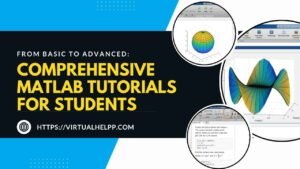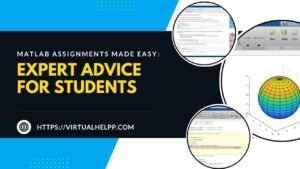When you’re deep into MATLAB, productivity isn’t just about getting things done—it’s about doing them efficiently and effectively. For students navigating complex projects and assignments, mastering MATLAB can be a game-changer. It’s not just about coding; it’s about making your code work for you, streamlining your workflow, and ultimately boosting your academic performance.

Table of Contents
ToggleWhy Productivity Matters in MATLAB
Importance of Efficiency in Coding
MATLAB is a powerful tool for mathematical computations, simulations, and data analysis. However, if you’re not using it efficiently, you might find yourself bogged down by long run times, endless debugging sessions, or tangled code. Productivity in MATLAB means quicker turnaround times and more reliable results, which is crucial for meeting tight academic deadlines and excelling in your studies.
Benefits for Academic Success
Efficient use of MATLAB not only helps in managing your workload but also improves the quality of your work. Well-organized code and effective use of MATLAB’s features can lead to better grades and a deeper understanding of complex concepts. It’s like having a well-oiled machine that gets the job done faster and with fewer hiccups.
Getting Started with MATLAB
Setting Up Your MATLAB Environment
Installation Tips
The first step towards productivity is a smooth setup. Make sure you download MATLAB from the official MathWorks site and follow the installation guide. Keep your software updated to benefit from the latest features and bug fixes. A fresh installation might seem straightforward, but ensuring that you have the correct version for your operating system and academic requirements is essential.
Customizing Your Workspace
MATLAB’s workspace can be customized to fit your needs. Arrange your layout to make your coding process more intuitive. You can add frequently used toolbars or windows, such as the Command Window, Workspace, and Editor. Customizing your environment will save you time by reducing the need to navigate through menus.
Understanding MATLAB Fundamentals
Mastering Basic Functions and Commands
Key MATLAB Commands
Getting comfortable with MATLAB’s basic commands is crucial. Start with fundamental functions like plot, mean, sum, and size. These functions form the backbone of many operations and understanding them thoroughly can speed up your coding process.
Utilizing MATLAB Documentation
MATLAB’s documentation is a treasure trove of information. Learn to use help and doc commands to access detailed explanations and examples of MATLAB functions. This can save you time searching for answers and help you understand the full capabilities of each function.
Advanced MATLAB Techniques
Leveraging MATLAB Toolboxes
Overview of Popular Toolboxes
MATLAB offers various toolboxes designed for specific tasks like statistics, machine learning, or image processing. Familiarize yourself with these toolboxes to expand your capabilities. For example, the Image Processing Toolbox provides functions for analyzing and processing images, which can be incredibly useful for certain assignments.
How to Choose the Right Toolbox
Choosing the right toolbox depends on your project needs. Evaluate the toolbox’s features and see if they align with your requirements. For instance, if you’re working on a project involving complex mathematical computations, the Symbolic Math Toolbox could be highly beneficial.
Optimizing Your Workflow
Efficient Coding Practices
Writing Clean and Readable Code
Writing clean code is not just about aesthetics; it’s about making your code easier to understand and maintain. Use descriptive variable names, include comments, and follow consistent formatting. This not only helps you but also others who might read your code later.
Debugging Tips and Tricks
Debugging is a crucial part of coding. Use MATLAB’s built-in debugging tools to set breakpoints, step through code, and inspect variables. This will help you identify and fix errors more efficiently, ensuring that your code runs smoothly.
Utilizing MATLAB’s Built-In Functions
Function Optimization
MATLAB’s built-in functions are optimized for performance. Whenever possible, use these functions instead of writing your own from scratch. For instance, functions like fft for Fourier transforms are highly optimized and can significantly reduce computation time.
Code Vectorization Techniques
Vectorization is a powerful technique in MATLAB. Instead of using loops, leverage matrix operations and functions that handle arrays. Vectorized code runs faster and is often more readable, making it a key practice for maximizing productivity.
Collaborating and Sharing Your Work
Working with MATLAB Files
Managing Scripts and Functions
MATLAB allows you to manage scripts and functions efficiently. Organize your code into scripts for specific tasks and functions for reusable code blocks. This modular approach makes it easier to manage and debug your code.
Saving and Sharing Projects
Use MATLAB’s project management features to save your work and share it with others. You can use .mat files to save variables and data, and .mlx files to share live scripts. This helps in maintaining a record of your work and collaborating with peers.
Exploring Additional Resources
MATLAB Community and Support
Engaging with Online Forums
The MATLAB community is a valuable resource. Engage with forums like MATLAB Central to seek help, share your knowledge, and learn from others’ experiences. This can provide you with new insights and solutions to common problems.
Using MATLAB Central and File Exchange
MATLAB Central and File Exchange offer a platform to download and share code, functions, and applications. Explore these resources to find pre-written code that can aid your projects and contribute to the community by sharing your work.
Integrating MATLAB with Other Tools
Combining MATLAB with External Software
Importing and Exporting Data
MATLAB can integrate with various external tools, such as Excel. Learn how to import and export data between MATLAB and other software to streamline your data analysis process. This can save time and reduce the risk of errors associated with manual data handling.
MATLAB and Excel Integration
Excel is a common tool for data management, and MATLAB provides functions for interacting with Excel files. Using xlsread and xlswrite functions, you can easily import data from Excel and export results back to it.
Maintaining Productivity
Avoiding Common Pitfalls
Time Management Strategies
Effective time management is key to productivity. Plan your MATLAB projects with clear milestones and deadlines. Use tools like timers and productivity apps to keep track of your progress and ensure that you stay on schedule.
Balancing MATLAB with Other Academic Responsibilities
Balancing MATLAB work with other academic tasks can be challenging. Prioritize your tasks, and allocate specific time slots for MATLAB work to ensure that you manage your time effectively and avoid burnout.
Conclusion
In summary, maximizing productivity in MATLAB involves understanding the software’s capabilities, applying efficient coding practices, and leveraging available resources. By mastering the basics, utilizing advanced techniques, and integrating MATLAB with other tools, you can significantly enhance your productivity and academic success.
FAQs
What are the best practices for writing efficient MATLAB code?
The best practices include writing clean and readable code, using built-in functions, and applying vectorization techniques. Additionally, utilizing MATLAB’s debugging tools and following efficient coding practices can improve performance.
How can I get help with MATLAB if I’m stuck?
You can seek help from MATLAB’s documentation, online forums, and community resources like MATLAB Central. Engaging with these resources can provide you with solutions and insights for any issues you encounter.
What are MATLAB toolboxes and how can they improve my work?
MATLAB toolboxes are add-ons that extend MATLAB’s capabilities for specific tasks. They provide specialized functions and tools for areas like statistics, machine learning, and image processing, enhancing your ability to tackle complex projects.
Can MATLAB be integrated with other software like Excel?
Yes, MATLAB can be integrated with Excel using functions like xlsread and xlswrite. This integration allows you to import data from Excel into MATLAB and export results back, facilitating data management and analysis.
How can Virtual Help support my MATLAB learning journey?
Virtual Help offers a platform where you can find tutors and get assignment help. With their iOS and Android apps, you can connect with experts who can assist you with MATLAB and other academic subjects, enhancing your learning experience.





